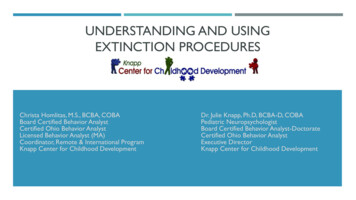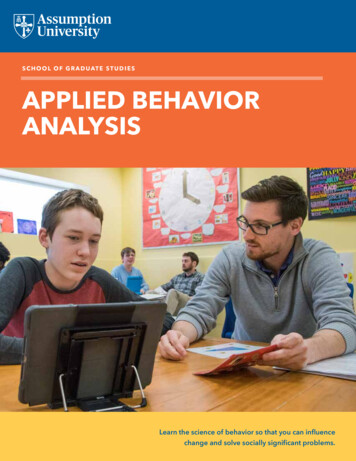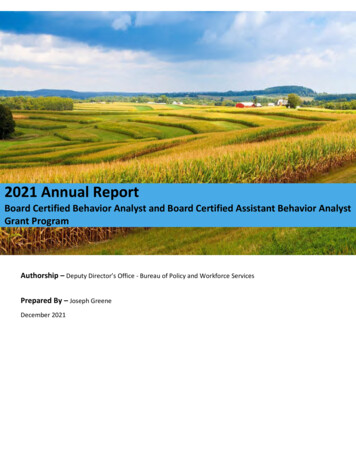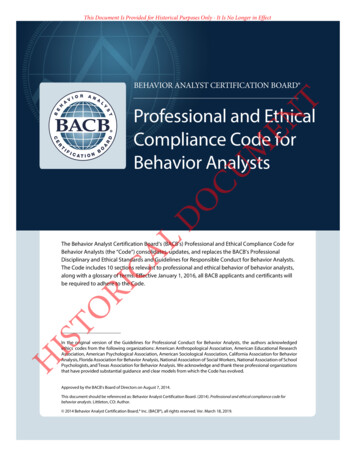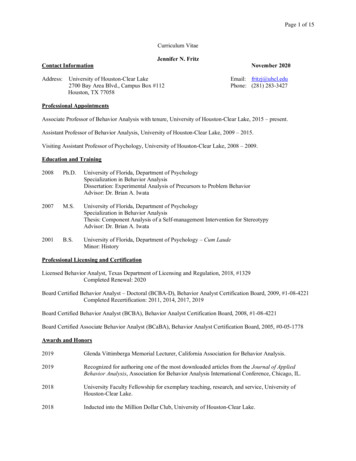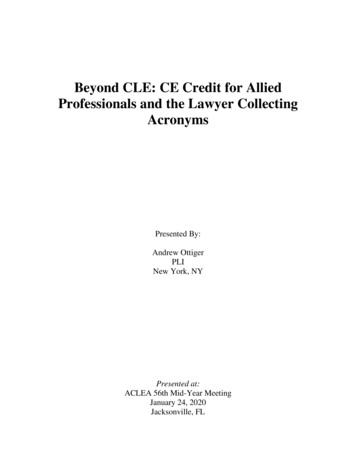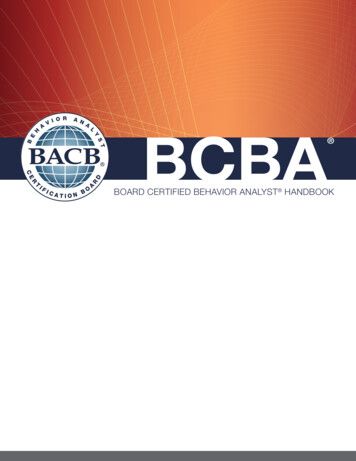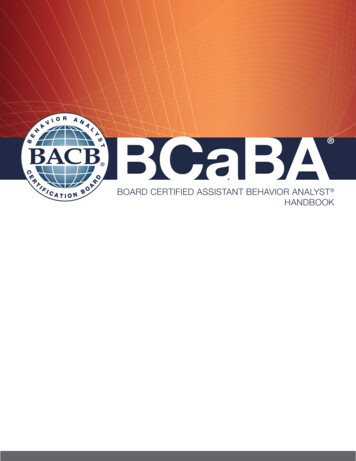
Transcription
BCaBA BOARD CERTIFIED ASSISTANT BEHAVIOR ANALYST HANDBOOK
ABOUT THIS HANDBOOKThis handbook describes the requirements for obtaining and maintaining BCaBA certification, including the eligibilityrequirements that went into effect on January 1, 2022. Applicants and certificants must comply with the requirementsoutlined in this handbook. Failure to do so may result in the BACB taking summary action (e.g., suspension,revocation, invalidation) against your eligibility or certification and/or submitting a Notice of Alleged Violation to theBACB Ethics Department.This handbook contains clickable images that link directly to BACB documents and web pages. To help withnavigation, this handbook also includes PDF bookmarks and a clickable Table of Contents icon ( ) on the cornerof each page. New versions of the BCaBA Handbook will be published quarterly as needed. Applicants completingrequirements in a future year should make note of upcoming implementation dates for revised requirements, as theymust meet the requirements in place at the time they apply and take the version of the examination in effect whenthey schedule their examination appointment. Please refer to the BACB Newsletter and the Upcoming Changes webpage for the most updated information on future certification requirements.The BACB does not discriminate against any individual because of race, ethnicity, gender, age, creed, disability,religion, marital status, sexual orientation, or national origin. Allegations of discrimination can be reported via ourAdministrative Appeal Request Form.For a complete list of updates included in this version of the BCaBA Handbook, please see page 60.The BACB reserves the right to amend the procedures outlined in this handbook.Updated 06/2022, Copyright 2022, BACB All rights reserved.Behavior Analyst Certification Board Board Certified Assistant Behavior Analyst Handbook ii
TABLE OF CONTENTSClick this icon to return to the Table of Contents.ContentsOverview. 1About the Behavior Analyst Certification Board. 1What Is a Board Certified Assistant Behavior Analyst?. 1Jurisdiction. 1Accreditation . 1Eligibility Requirements. 5Eligibility Pathways. 5Supervised Fieldwork Requirements . 9Applying for BCaBA Certification . 21Submit Your Application.21Schedule Your Examination Appointment.23Fees.23Examination. 24Examination Development.24Preparation.24Examination Outline.24Scheduling. 26Pearson VUE Examination Fees. 26Examination Accommodations .27What to Expect on Examination Day.27General Rules for Taking the Examination. 28Examination Terms and Conditions. 29Examination Security.30Examination Appeals.31Examination Results.31Examination Retakes.31Scoring Methodology.31What to Expect After Passing the Examination. 32Certification Maintenance Requirements . 34Continuing Education.34Ethics and Self-Reporting .36Ongoing Supervision.40Recertification .44Inactive Policy.46Assessing, Training, and Supervising RBTs. 48Assessing, Training, and Supervising RBTs.49Other Relevant Policies. 51Administrative Appeals.51Acceptable Signatures Policy. 52Documentation Policy. 52Submission of False, Forged, or Untrue Information to the BACB. 52Timely Responding to the BACB. 52Updated 06/2022, Copyright 2022, BACB All rights reserved.Behavior Analyst Certification Board Board Certified Assistant Behavior Analyst Handbook iii
TABLE OF CONTENTS Documents and Resources. 53Eligibility and Applying for Certification.53Coursework.53Supervised Fieldwork.53Examination.53Ongoing Supervision.53Continuing Education.53Ethics and Self-Reporting.53Voluntary Inactive Status.53Supervising, Training, and Assessing RBTs.54Administrative Appeals.54Glossary. 55Appendix. 58Application Processing Agreement. 58Version History and Updates. 60Version 2/18/2021 Updates. 60Version 5/7/2021 Updates. 60Version 9/16/2021 Updates. 60Version 1/1/2022 Updates. 60Version 4/1/2022 Updates.61Version 5/31/2022 Update.61Updated 06/2022, Copyright 2022, BACB All rights reserved.Behavior Analyst Certification Board Board Certified Assistant Behavior Analyst Handbook iv
OverviewOverviewAbout the Behavior Analyst Certification BoardThe Behavior Analyst Certification Board, Inc. (BACB ) has been the leader in behavior analyst certification for overtwo decades. The BACB is a nonprofit corporation that was established in 1998 to meet professional certificationneeds identified by behavior analysts, governments, and consumers of behavior-analytic services. The BACB’smission is to protect consumers of behavior-analytic services by systematically establishing, promoting, anddisseminating professional standards of practice.In the profession of applied behavior analysis, the BACB’s primary role is to operate certification programs, whichinvolves responsibilities similar to regulatory boards. In this role, the BACB establishes practice standards, administersexaminations, and provides ethics requirements and a disciplinary system for each of its certification programs. Tolearn more about our role and limitations, read our blog post, The BACB: What it is, What it Does, and Why, and listento Episode 11 of our podcast, Inside the BACB.What Is a Board Certified Assistant Behavior Analyst?The Board Certified Assistant Behavior Analyst (BCaBA) is an undergraduate-level certification in behavior analysis.Professionals certified at the BCaBA level provide behavior-analytic services under the supervision of a BoardCertified Behavior Analyst (BCBA).Professionals certified at the BCaBA level may not provide behavior-analytic services without the supervision of aBCBA. BCaBAs may supervise the work of Registered Behavior Technicians (RBTs).Note: In the interest of consumer protection and to ensure that the BACB certification mark is only used to accuratelyrepresent certification status, the BACB may seek legal and other remedies to address any misrepresentation ofBACB certification (and/or any misuse of other BACB trademarks and logos) that constitutes trademark infringement.For more information about the use of BACB certification marks, see the September 2008, October 2013, and July2021 BACB Newsletters.JurisdictionThe BACB currently accepts certification applications from individuals regardless of their country of residence.Effective January 1, 2023, only individuals who reside in the US, Canada, Australia, and the United Kingdom* mayapply for BACB certification.AccreditationThe BCBA , BCaBA , and RBT certification programs are accredited by the National Commissionfor Certifying Agencies (NCCA), the accreditation body of the Institute for Credentialing Excellence(ICE). NCCA’s Standards for the Accreditation of Certification Programs were the first standardsdeveloped for professional certification programs to help ensure the health, welfare, and safety ofthe public. NCCA standards articulate the essential elements of a high-quality certification program.Consistent with these standards, the BACB’s certification requirements, examination content, andprocedures undergo regular review by subject matter experts in the discipline. To learn more aboutaccreditation, see ICE’s video, Value of Accreditation: Why it Matters.* Individuals who reside in the UK may continue to apply for BACB certification through 2025. This date may be moved earlierif the UK Society for Behaviour Analysis seeks national recognition for UK behavior analysts, develops its own credentialingsystem, and transitions current BACB certificants into the UK system.Updated 06/2022, Copyright 2022, BACB All rights reserved.Behavior Analyst Certification Board Board Certified Assistant Behavior Analyst Handbook 1
OverviewReasons for Becoming a BCaBAThere are many benefits to obtaining BCaBA certification, including: BCaBA certification is the leading assistant behavior analyst credential and is required by many fundersand licensure boards. BCaBA certification is offered by the first certifying entity in behavior analysis, theBACB, which has been certifying behavior analysts for over 20 years. BCaBA certification shows that you have met certain requirements that are critical in providing behavioranalytic services under the supervision of a BCBA. BCaBA certification provides increased consumer protection since you must meet certain eligibility andmaintenance requirements to obtain and maintain certification. BCaBA certification makes it easier for employers, funders, and consumers, among others, to verify thatyou have certain knowledge, skills, and abilities and are not under disciplinary sanctions.You Want to Pursue Certification Now What?*So, you are interested in pursuing BCaBA certification. What should you do now? Although the BACB cannotinstruct you on how to meet our requirements, the content in this section is intended to provide some guidancethat might be helpful as you start this journey.A Few Tips Before Getting StartedFirst. carefully review both the eligibility and maintenance requirements that are detailed in this handbook. Then,determine which eligibility pathway you plan to pursue. Once you have selected a pathway, determine whenyou might apply, as it may take a few years to meet all of the requirements, and the eligibility requirementsmay change.Third, you will want to create a BACB account using these tips: Enter your full name exactly as it appears on your government-issued identification. If it does not matchexactly, you will not be able to take the examination. Name changes require review by BACB staff, so aname change could delay your ability to take the examination. Use a personal email address and not a work or school email address. Important notifications andreminders are sent to this address, so if you switch employers or lose access to your school emailaddress, you will not receive reminders, correspondence, or password resets. Set up the profile yourself and do not share your account information with anyone else, including youremployer. This is your certification—no one else should be managing it for you. Update your information in your BACB account as soon as changes occur (e.g., name change,address change).Creating a BACB account will give you a BACB account ID number, which you will need to add to documents asyou work toward certification. Having a BACB account also means that you will receive important updates fromthe BACB.* This is not a comprehensive resource for all activities you will need to or should complete as you prepare for certification.Updated 06/2022, Copyright 2022, BACB All rights reserved.Behavior Analyst Certification Board Board Certified Assistant Behavior Analyst Handbook 2
OverviewConsiderations When Exploring Training OptionsYou only receive your initial training once. If possible, don’t pick your training out of convenience, expense,or geography. We recommend thoroughly researching the trainings before committing to one. While we can’tprovide guidance on where to receive your behavior-analytic coursework, here are some things to consider.Ideally, you should obtain your education in behavior analysis from a behavior-analytic degree program. There aremany benefits to this option. For instance, in most cases, you can meet all BCaBA eligibility requirements in one placewhile also having engaging, non-classroom interactions with behavior-analytic faculty and students that will greatlyenhance your education and begin to develop your behavior-analytic social networks. Even if you don’t receive all ofyour supervised fieldwork through the degree-granting program, your faculty will likely help you identify where youcan accrue your hours in an immersive behavior-analytic environment. If completing your education in a behavioranalytic degree program is a possibility for you, here are a few things to consider as you research programs.First, research the faculty members and determine whether the program’s interest(s) align with yours (see the ABASubspecialty Resources on the About Behavior Analysis web page for some of the areas in which behavior analysishas been applied). Second, identify the program’s structure to determine how much time you will have with your facultyand fellow students. Third, confirm that the program has a pathway to meet the BACB’s coursework requirements.You may obtain your behavior-analytic coursework through one of two sources: an Association for BehaviorAnalysis International (ABAI) accredited undergraduate program or a Verified Course Sequence. ABAI-Accredited Undergraduate Program (Pathway 1): Behavior-analytic undergraduate programs thathave been accredited by ABAI have met ABAI’s accreditation standards, which include standards for thecurriculum, faculty, and resources, among other areas. Accredited programs may be found on ABAI’sAccredited Programs web page. Note: If you receive an undergraduate degree from an ABAI-accreditedprogram, both the coursework and degree eligibility requirements will be met. Verified Course Sequence (Pathway 2): The other option for completing behavior-analytic courseworkis through a Verified Course Sequence. A Verified Course Sequence is a set of courses that have beenverified by ABAI as having met the BACB’s behavior-analytic coursework requirements. Although someVerified Course Sequences are embedded in an ABAI-accredited undergraduate program, many arenot. Verified Course Sequence status merely indicates that the content-hour requirements for certainbehavior-analytic courses have been reviewed. Verified Course Sequences may be located using ABAI’sVerified Course Sequence Directory.Finally, when determining where to obtain your coursework, you might also want to consider: Program Focus: Do you have any existing areas of interest? If so, does the program align with yourprofessional goals? Is the program led by faculty with similar interests? Will the program help facilitateexperience in areas that are meaningful to you? Program Size: Find out the size of each cohort and determine if the size is a good fit for you as a learner.This information can usually be found on the program’s website. Our university pass rate documents alsogive an idea of program size by looking at the number of candidates who took the examination from aninstitution each year (see the Sort by Volume section of the document). Program Structure: Courses are usually taught on campus, online, or in a combination of online andon-campus experiences (again, this information should be available on the program’s website). Considerwhat structure is the best fit for you as a learner. You might want to consider what has worked for you inthe past. Were you successful in online courses? Did you need or value in-person experiences? In whatsetting did you learn the most and feel the most engaged? Number of Faculty: Determine how many part- and full-time faculty are on staff, especially in relation tothe program size, to understand the student-to-faculty ratio. University Pass Rates: The BACB annually publishes examination pass rate data for universities withVerified Course Sequences. Passing the BCaBA examination is not the most important part of yourtraining, but, at a minimum, your training should prepare you to pass the examination.Updated 06/2022, Copyright 2022, BACB All rights reserved.Behavior Analyst Certification Board Board Certified Assistant Behavior Analyst Handbook 3
OverviewOnce you have identified where you will get your behavior-analytic coursework, your faculty mentor/advisor,program chair, and/or Verified Course Sequence Coordinator will be your resource to help you meet the BACB’srequirements along the way.Considerations When Identifying Practical Fieldwork OpportunitiesHold on! Remember that qualifying behavior-analytic coursework needs to begin before fieldwork, so make sureyou get your coursework situation figured out beforehand. Once you have started your coursework, determinewhere you want to accrue your structured fieldwork hours and whether it will give you the applied experiencethat will prepare you to practice after you are certified. For instance, consider the population(s) and setting(s)where you want to ultimately provide behavior-analytic services. The BACB cannot provide this guidance, so youshould reach out to your Verified Course Sequence Coordinator, advisor, or employer for guidance about whereto accrue fieldwork in your chosen area.When identifying supervisor(s) to oversee your fieldwork hours, ensure that they are qualified to be your supervisor(see the Fieldwork Requirements section). In addition, you should focus on finding supervisors who have asuccessful track record of BACB supervision. You could do this in a number of ways, but here are a few ideas: Check on their certification status in the Certificant Registry to ensure that they are qualified to superviseand to see if they have any disciplinary sanctions. Look at how long they have been certified. We recommend identifying supervisors who have beencertified for at least a year, if not longer. Note: BCBAs in their first year of certification who are supervisingfieldwork must have a consulting supervisor. Gather information from the supervisor and past supervisees about the supervisor’s style to make surethey are a good fit for you. Ask about their time and document-management systems. Caution: If you can’t produce all of thenecessary documents to support your fieldwork in the event of an audit, you might lose fieldwork hours,so you will want a very organized supervisor! Determine whether they are familiar with the BACB’s requirements. Consider whether they could customize the fieldwork to your interests (while still meeting their ethicalobligations as a BCBA to stay within their area of competence).Once you have identified fieldwork site(s) and supervisor(s), complete the Fieldwork Checklist and Tip Sheetbefore you get started with each fieldwork site/supervisor. The BACB is not able to provide guidance beyondwhat is in our fieldwork requirements, as each situation is unique (e.g., whether a specific activity will qualifytoward your fieldwork hours). Work together with your supervisor(s) to ensure that you are meeting the fieldworkrequirements while also meeting your professional goals.A Few Final Tips Keep this handbook close by. We will update the handbook quarterly as needed, so always make surethat you are reviewing the most current handbook to see what has changed since the last version. It isalso important that you become familiar with all applicable licensure requirements in your area. Frequently check the BACB website for new resources, including videos, blogs, and podcasts. Forexample, the Tips for New Certificants blog shares valuable information for newly certified individuals,and The Professional Infrastructure of Applied Behavior Analysis video describes the variousorganizations within the ABA profession. Get involved and engaged with your behavior-analytic community! This might include joining orvolunteering with your local, regional, or national professional associations and groups focused in yourarea(s) of interest. You will likely learn a lot and have an opportunity to contribute to behavior analysisand its consumers. Having professional support is helpful at every stage of your career, so createopportunities to identify trusted colleague(s), mentors, and/or groups now. As you pursue certification, ensure that you do not represent yourself as a BCaBA trainee or applicant toprevent consumers from being confused about your qualifications. For more information about use of theBCaBA certification mark, see the September 2008, October 2013, and July 2021 BACB Newsletters.Updated 06/2022, Copyright 2022, BACB All rights reserved.Behavior Analyst Certification Board Board Certified Assistant Behavior Analyst Handbook 4
Eligibility RequirementsEligibility RequirementsEligibility PathwaysFor those applying on or after January 1, 2022, you have two pathways for applying for BCaBA certification.Each pathway requires a degree, behavior-analytic content, supervised fieldwork, and passing the BCaBAcertification examination.Overview of Eligibility PathwaysPathway 1: Degree FromPathway 2: Behavior-Analytic CourseworkABAI-Accredited ProgramDegreeUndergraduate degreeBachelor’s degree or higher from an ABAIBehavior-analyticaccredited programBehavior-analytic courseworkcontentFieldworkPractical fieldwork in applied behavior analysis Practical fieldwork in applied behavior analysisThe following pages provide further details for each eligibility pathway.Updated 06/2022, Copyright 2022, BACB All rights reserved.Behavior Analyst Certification Board Board Certified Assistant Behavior Analyst Handbook 5
Eligibility RequirementsPathway 1: Degree From Association for Behavior Analysis International (ABAI)Accredited ProgramTo apply for BCaBA certification via this pathway, you must have a bachelor’s degree or higherfrom an ABAI-accredited program and have completed supervised fieldwork.(BACHELOR'S DEGREE ORHIGHER FROM AN ABAIACCREDITED PROGRAM SUPERVISED FIELDWORK)PASSEXAMINATION CERTIFICATIONVersion 3/18/2022, Copyright 2022, BACB All rights reserved.DegreeYou must have obtained a bachelor’s degree or higher in 2015 or later, and the degree musthave been obtained while the program was accredited. For example, your degree would meetthe degree requirement if you received your bachelor’s degree in 2018 from a program that wasaccredited from 2016 to 2022.Does the BACBuse primary sourceverification of degreesand coursework?Yes! Under everyeligibility pathway, we relyon official transcripts toverify that an
Professionals certified at the BCaBA level provide behavior-analytic services under the supervision of a Board Certified Behavior Analyst (BCBA). . developed for professional certification programs to help ensure the health, welfare, and safety of the public. NCCA standards articulate the essential elements of a high-quality certification .
